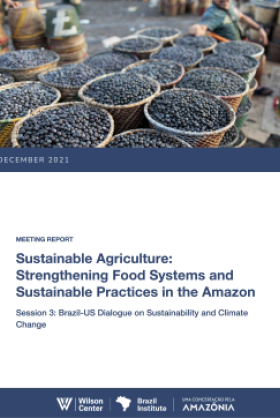Meeting Report | Sustainable Agriculture: Session 3 of the Brazil-US Dialogue on Sustainability and Climate Change



In October 2021, the Wilson Center, in partnership with Uma Concertação Pela Amazônia hosted a discussion with Brazilian and US nongovernmental stakeholders on how to bring resources at scale to promote inclusive and effective sustainable food systems in the Amazon region. The results achieved so far are insufficient to enable the transition from current models to sustainable systems that promote the improvement of income and quality of life of family producers and traditional populations of the Amazon.
Over the course of the session, three major policy recommendations emerged as critical to bolstering bilateral Brazil-US cooperation in strengthening food systems and sustainable practices in the Amazon.

The Brazil Institute—the only country-specific policy institution focused on Brazil in Washington—aims to deepen understanding of Brazil’s complex landscape and strengthen relations between Brazilian and US institutions across all sectors. Read more
